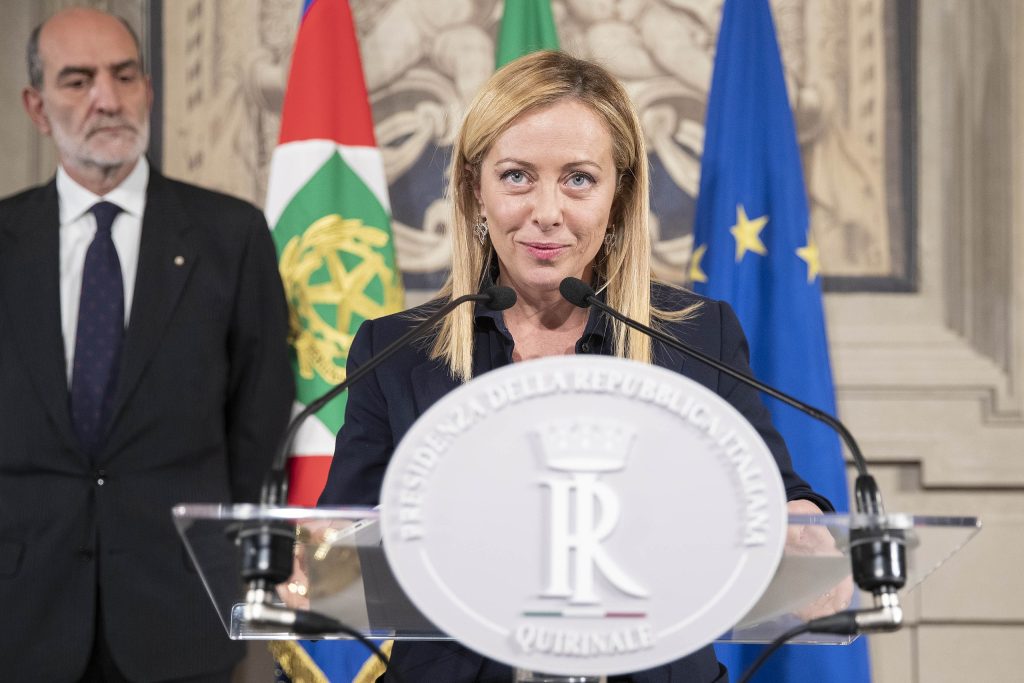The resounding election victory for Giorgia Meloni’s Fratelli d’Italia in Italy’s general election in September marked a major political shift in a country previously run by Mario Draghi’s pro-European government. For the first time since the Second World War, a founding member of the European Union will be governed by a far-right party with its roots in post-fascism.
A look at Italy’s political and economic evolution over the last few decades will help to put September’s result into context. The Italian political and institutional landscape is characterized by structural instability. Since the birth of the Italian Republic in 1946, Italy has had no less than sixty-two governments of varying political stripes: a tendency that continues today, with the country preparing to inaugurate its fourth government since 2018.
One major factor in this frequent transfer of power was the ‘Mani Pulite’ (Clean Hands) operation beginning in 1992. A series of investigations that uncovered a system of economic corruption and illegal party financing, the scandal had a profound impact on Italian society, which increasingly began to reject the political class altogether. This sense of distrust was heightened by extremely disappointing economic progress: economic growth has been very slow since the 1990s and the country is also faced with an aging population and increasingly precarious working conditions. As shown by the statistics of the European Commission, the IMF, and the OECD, several key issues have been neglected by successive governments: the significant gap in economic performance between the north and south of the country, the problem of tax evasion, the structural weakness of the public sector, the lack of investment in production, youth unemployment, and an education system that falls short of the EU average on most indicators.
This situation produced a new way of conducting politics: the populism incarnated by Silvio Berlusconi, who won his first electoral victory in 1994. His slogan – ‘Un presidente operaio per cambiare l’Italia’ (‘a president worker to change Italy’) – portrayed a man whose success was entirely due to his own efforts and achieved despite state bureaucracy. It hit the mark with voters who thought a charismatic entrepreneur capable of creating jobs would do better than the corrupt institutions no longer able to ensure the common good.
The power of this approach has since inspired other leaders seeking to upset the status quo with a new narrative and the force of their personal charisma. The Movimento 5 Stelle, the anti-establishment movement created in 2009 by the comedian Beppe Grillo, won 25.5% of the vote in the general election in 2013 and went on to become the country’s foremost political force, winning 32% of the vote in 2018. Grillo’s declared enemy is the casta, the corrupt political class. His changeable and opportunistic ideas flirted with both left and right, mingling environmental issues, social justice, and opposition to rights for immigrants.
The Five Star Movement was most successful in southern Italy, while the Lega, a far-right populist party, also achieved excellent results under its flamboyant leader Matteo Salvini, particularly in the north. Salvini, a former MEP from Milan known by his supporters as ‘il capitano’, based his campaign around immigration, tax cuts, and open conflict with the European Union. He led the party to its best ever election results in 2018, with 17.3% of the vote.
The new faces of the far right
At this point, the destiny of the Lega in Italy converged with that of the Rassemblement national in France, after a long alliance that began when both parties joined the same European parliamentary group, ‘Identity and Democracy’. On either side of the Alps, the two Putin admirers set about making their parties more palatable to the wider public: Salvini brandished a crucifix to demonstrate his loyalty to traditional values and Europe’s Christian identity, while Le Pen shifted the focus to social welfare during the pandemic and then purchasing power in the face of inflation. The French elections in 2022 marked the zenith of this process: the RN now has a record number of deputies (89) in the National Assembly, while the Lega had 133 elected deputies in 2018.
Salvini has since lost his bearings, however. His reputation has been damaged by his lack of self-control and his inconsistencies during the pandemic and the Ukraine war, a situation that another member of the right-wing coalition, Giorgia Meloni, quickly exploited. During her electoral campaign, Meloni attempted to gloss over her background as a former activist for the post-fascist party National Alliance, instead emphasizing the economic difficulties faced by Italian households and the virtues of the ‘natural family’. The groundwork for her victory was undoubtedly laid as much by Salvini’s populist style and divisive speeches as by widespread social discontent.
The record low turnout (37%) in this Italian general election revealed the fragility of the political system: a crisis of the parties, electoral laws that encourage the creation of coalitions, a cult of personality surrounding leaders, a society that has been heavily impacted by inflation, citizens who feel increasingly detached from politics. Besides these specific Italian issues, there are also problems common to other countries. All these political personalities portray themselves as ordinary people, avengers come to ‘assassinate’ the establishment, whether the left, technocrats, or the financial sector.
Like Salvini, Meloni presents herself as an ordinary person: she emphasizes her personal narrative as a child growing up in the working-class areas of Rome, abandoned by her father but who managed to pull herself up by her bootstraps (recalling Berlusconi’s persona of the self-made man). All three Italian populists deliberately wear the same clown mask: watching their numerous television appearances, their systematic use of smiles and laughter is striking. In France. Marine Le Pen also likes to be seen singing, dancing, and laughing, as at the Paris International Agricultural Show or when visiting France’s overseas departments ahead of the 2022 elections.
Far-right ideas slip in under cover of these friendly, reassuring faces, which conceal the true authoritarian nature of their policies (closing ports to migrants, defending the natural family, restricting the right to abortion, an ‘Italians first’ approach). The casual, friendly smile, often backed up by the choice of light-coloured clothing, suggests an empathetic, like-minded person and overcomes fears of loneliness, precarity and an uncertain future. There is no longer any rational barrier to fear in the face of international and climate insecurity, unstable personal relationships, and precarious working conditions; people are suspicious of institutions and no longer feel part of powerful forms of community.
Populist leaders in Italy, France and elsewhere have insinuated themselves into this fear. The incessant transformations of Italian political life, and the tendency of its key players to change places on the political chessboard, only increases this fear. Giorgia Meloni’s far-right party, like Marine Le Pen’s, was able to capitalize on this trasformismo.

Published in cooperation with CAIRN International Edition, translated and edited by Cadenza Academic Translations.








